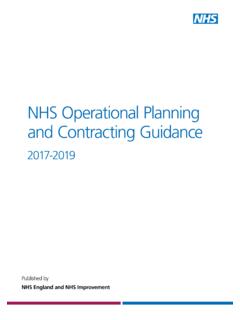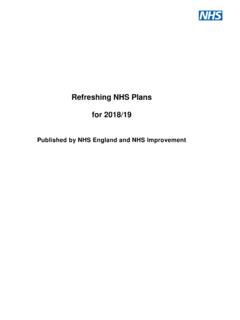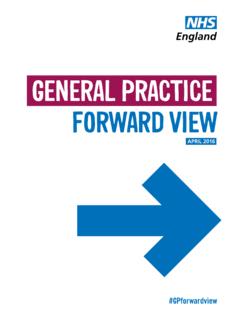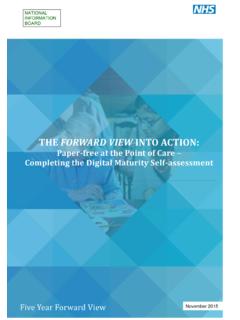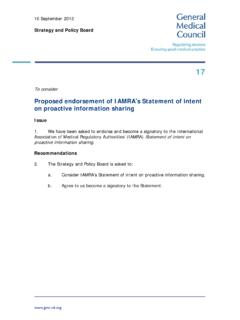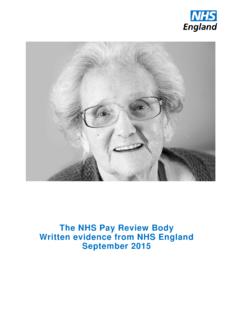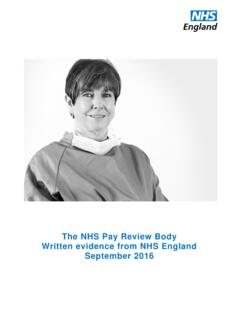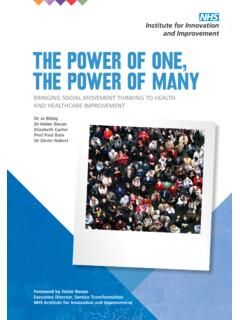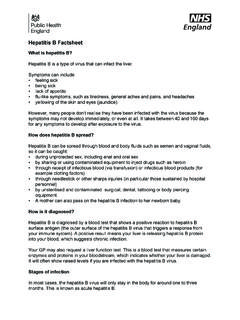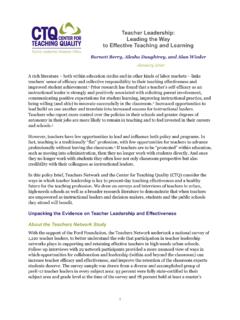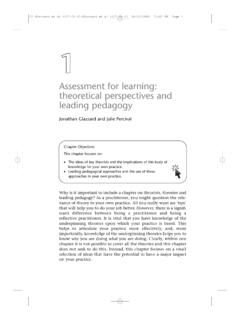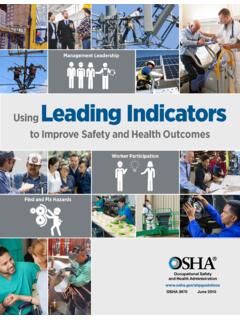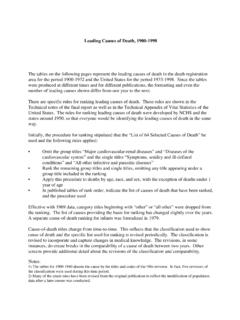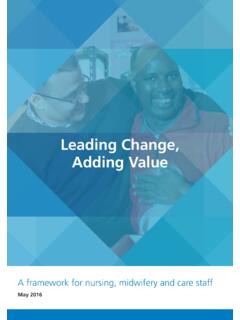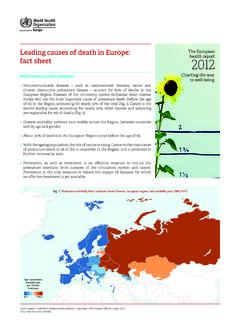Transcription of Leading the acceleration of evidence into practice: a guide …
1 NHS England and NHS Improvement Leading the acceleration of evidence into practice: a guide for executive nurses March 2020 1 | Contents Contents Foreword .. 2 National Institute for Health Research overview of Leading the acceleration of evidence into practice .. 4 Introduction .. 5 Creating the right settings for evidence informed practice .. 7 Supporting staff to engage with evidence .. 15 Translating evidence into practice .. 18 Assuring improvement .. 22 Conclusion .. 24 Further resources .. 26 References .. 28 2 | Foreword Foreword When I began my role as Chief Nursing Officer for England, I made it clear that nurses and midwives Leading transformational change are at the heart of my long-term vision. To help achieve this I set out three priorities. The first is to build a workforce fit for the future; the second is restoring and renewing the reputation of the nursing and midwifery professions across the health and care sectors, and the third is for us to speak with one voice as a profession.
2 Central to successful system transformation is to truly demonstrate the use of evidence -based practice. We know the importance of this is often stated, but how much research is translated into practice varies across the country. I want to work with executive nurses to deliver the ambitions in this guide . The implementation of the evidence -base can be achieved by creating the right culture, the right leadership at the point of care, capability in interpreting and implementing evidence and engaging staff and patients in evidence -based policy and practice. I am a strong advocate for environments which embrace evidence -based practice, leadership at all levels and establishing mechanisms to support staff as innovators within their own areas of practice. Accelerating the use of research and evidence into practice helps us continually strive to prevent and tackle health inequalities and improve the care experience for the patients, individuals and populations we care for and work alongside.
3 Additionally, it ensures strong nursing leadership is recognised as key to the delivery of the NHS Long Term Plan. I have witnessed many excellent examples of organisations embedding the use of research and evidence in practice making it a part of everyday culture. This has served to truly enhance and improve practice, influenced nursing strategy and empowered nurses in their leadership and career aspirations. Creating an evidence -informed profession involves a number of roles, from researchers and clinical academics, and all nurses and midwives each embedding 3 | Foreword evidence in everyday practice in whatever role they undertake, in every area of practice. This guide is written to support you as leaders and role models in putting a greater focus on research and evidence , equipping nursing and midwifery leaders with the necessary knowledge, skills and enthusiasm to drive and embed evidence -based improvements and innovations. I would like to thank the NIHR Dissemination Centre as our partner, for its approach to enhancing evidence -based practice among nursing and midwifery teams and for its work with us to drive forward innovation and improve patient care.
4 This guide is primarily directed at executive nurses and midwives working in positions where you have the opportunity to lead the acceleration of evidence into practice. I hope it will also be useful for lead nurses in social care, third sector and private facilities. I encourage you to read the guide and its examples of good practice and to think about how you could implement the practical advice in your organisation. I look forward to seeing the outcomes research implemented within practice as we work together to improve care, experience and outcomes for those we care for while also ensuring that the importance of nursing research is fully recognised and understood. Ruth May Chief Nursing Officer for England 4 | National Institute for Health Research overview of Leading the acceleration of evidence into practice National Institute for Health Research overview of Leading the acceleration of evidence into practice This guide is intended to promote awareness and use of evidence in organisations across the system.
5 The National Institute for Health Research (NIHR) was set up in in 2006 and is now the nation s largest funder of health and care research. There has never been a better time to implement research findings, with a variety of resources and support to hand. In previous times, it could be argued that there was often less understanding of the value of research and relevance to busy clinical staff and managers, and it could also be hard to find. Now there are much stronger systems for practice-informed research and research-informed practice. The NIHR focuses on real-world problems and uncertainties which are relevant to nursing and midwifery and the funding of high-quality studies across a variety of subjects, specialities and sectors. Nurses, midwives and other professionals, together with patients and the public, come together on formal panels to decide which studies are funded and identify topics for new research. The NIHR also funds fellowships and teams to support nursing research.
6 And when research is complete, the NIHR works with nurses and midwives to make sense of the evidence and promote its use in practice through evidence summaries and themed reviews. We are delighted to work in partnership with the Chief Nursing Officer for England in producing this guide to offer practical advice on developing an evidence -informed culture and how to incorporate evidence into business as usual and we look forward to working more closely with executive nurses. Tara Lamont, Director, NIHR Dissemination Centre Elaine Maxwell, Clinical Advisor, NIHR Dissemination Centre 5 | Introduction Introduction This is a practical guide to provide executive nurses with insight into fostering a culture that encourages staff to be innovative and use research and evidence to inform and support the sustainability and transformation of care. Such a way of working will also put the professions at the heart of achieving the Long Term Plan (NHS England 2019) and other national agendas and initiatives.
7 The guide recognises the challenge for executive nurses in creating and Leading an evidence -informed practice environment. It includes examples of how to enable such provision (eg access to pertinent evidence summaries) and to support staff to translate research into practice across settings. For some, this may be a new way of working, so the guide aims to support success through a blend of practical advice and insights from organisations who are further along this journey. Background The role and responsibilities of executive nurses are wide-ranging but assuring professional nursing standards within the organisation remains firmly at the core of all practice. The Nursing and Midwifery Council (NMC) sets out a framework for practice in the standards within its code (2018). One of the four principles of the code is to practise effectively. This requires all registrants to always practise in line with the best available evidence , and inherent in this is the need for nursing, midwifery and care staff to continually refresh their knowledge of the best available evidence to enhance outcomes and experiences for patients, individuals and populations.
8 An important, wider benefit of organisations promoting and valuing evidence -based practice is that such environments correlate with increased levels of job satisfaction; nurses and midwives who are engaged and empowered to deliver research-informed care may also experience increased cohesion in team structures (World Health Organization 2017). The NMC code describes registrants personal responsibility for keeping up to date with the best available evidence and for this evidence to inform their practice. However, to enable this, the system, organisations and teams need to ensure that 6 | Introduction relevant, actionable evidence can be identified and presented in a way that practitioners can engage with and use to influence their practice establishing an environment that facilitates this way of working. There is an additional challenge in that more evidence is published daily than individuals can absorb. While organisations share selected studies, there is an opportunity to do more to help staff translate evidence into practice.
9 Research suggests that it takes an average of 17 years for new understanding and knowledge to be incorporated into clinical practice, and that the application of this knowledge can be variable (Morris, Wooding and Grant 2011). The journey from evidence into practice can be complex, with at least five stages recognised from knowledge discovery to evidence summary, then translation into practice recommendations, integration into practice and evaluation (Stevens 2004). Ensuring smooth transitions between these stages needs careful planning. We recommend that organisations and systems create an environment that complements individual professional responsibility, establishing processes which facilitate this translation of research into practice. This includes integrating evidence developed from experience with best available literature (Sackett 1996). A vision for research and evidence in nursing This guide directly aligns to the vision for research and evidence in nursing articulated by Ruth May, Chief Nursing Officer for England, as well as the ways of working promoted and advocated by the NIHR.
10 The guide considers examples of why it is important to enhance nursing research capacity and capability, as well as how executive nurses champion and influence the provision of the right settings and support to undertake research within health and care delivery; using evidence and evaluation to inform and influence practice. Use of evidence is a key aspect of nursing excellence and demonstrating this through collective leadership and accreditation can provide additional assurance to the board and the public. 7 | Creating the right settings for evidence informed practice Creating the right settings for evidence informed practice Over recent years, there has been focus on increasing the number of nurses and midwives actively involved in conducting research and obtaining doctoral qualifications. This includes the jointly developed Health Education England (HEE) and National Institute for Health Research Integrated Clinical Academic Programme, which helps individual practitioners to develop the skills to be independent researchers.
